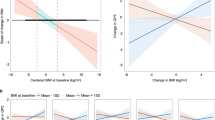Abstract
Objective: To examine the association between results of educational tests and the anthropometric status of schoolchildren.
Design: Cross-sectional data collected during the baseline survey of a randomised trial.
Setting: Eighty-one primary schools in three districts of northern Vietnam.
Subjects: A total of 3055 schoolchildren enrolled in class 3 and born in 1990.
Main outcome measures: Tests of mathematics and Vietnamese language developed not to show floor or ceiling effects, and Z-scores of height-for-age, weight-for-age and weight-for-height.
Results: After controlling for age, sex, district and school the results of test scores in both mathematics and Vietnamese were significantly negatively correlated with Z-scores of height-for-age (P<0.001) and weight-for-age (P<0.001), but not with weight-for-height (P=0.75).
Conclusions: A cross-sectional negative association was observed in Vietnamese primary school children between indicators of chronic undernutrition and tests of educational achievement.
Sponsorship: The study was funded by donors to the Partnership for Child Development including the Rockefeller Foundation and the World Bank.
European Journal of Clinical Nutrition (2001) 55, 801–804
This is a preview of subscription content, access via your institution
Access options
Subscribe to this journal
Receive 12 print issues and online access
$259.00 per year
only $21.58 per issue
Buy this article
- Purchase on Springer Link
- Instant access to full article PDF
Prices may be subject to local taxes which are calculated during checkout
Similar content being viewed by others
References
Adey P (1992) Gender differences in the application of intellectual processes Studia Psychol. 34 225–245
Dean AG, Dean JA, Coulombier D, Brendel KA, Smith DC, Burton AH, Dicker RC, Sullivan K, Fagan RF & Arner TG (1994) Epi Info, Version 6. Atlanta, GA: Centers for Disease Control
Gibson RS (1990) Principles of Nutritional Assessment. Oxford: Oxford University
Grantham-McGregor S (1995) A review of studies of the effect of severe malnutrition on mental development J. Nutr. 125 S2233–S2238
Grantham-McGregor S, Powell C & Fletcher P (1989) Stunting, severe malnutrition and mental-development in young-children Eur. J. Clin. Nutr. 43 403–409
Grantham-McGregor SM, Powell CA, Walker SP & Himes JH (1991) Nutritional supplementation, psychosocial stimulation, and mental development of stunted children—the Jamaican study Lancet 338 1–5
Grantham-McGregor SM, Walker S & Chang S (2000) Nutritional deficiencies and later behavioural development Proc. Nutr. Soc. 59 1–8
Hare BR (1985) Reexamining the achievement central tendency: sex differences within race and race differences within sex. In Black Children: Social, Educational and Parental Environments, ed. H McAdoo, RJ McAdoo and J Lewis. Thousand Oaks, CA: Sage
Kramer JH, Delis D, Kaplan E, O'Donnell L & Prifiera A (1997) Developmental sex differences in verbal learning Neuropsychology 11 577–584
Lansdown R (1999) How to Develop Tests of Educational Achievement for Research Studies Oxford: Partnership for Child Development
Macintosh HG & Morrison RB (1969) Objective Testing London: University of London Press
Mendez MA & Adair LS (1999) Severity and timing of stunting in the first two years of life affect performance on cognitive tests in late childhood J. Nutr. 129 1555–1562
Moock PR & Leslie J (1986) Childhood malnutrition and schooling in the Terai region of Nepal J. Dev. Econ. 20 33–53
Nokes C (1996) A healthy body and a healthy mind?: The relationship between ill-health and cognitive function in school-age children J. Biosoc. Sci. 28 453–462
Nokes C & Bundy DAP (1994) Does helminth infection affect mental processing and educational-achievement? Parasitol. Today 10 14–18
Peeling AN & Smart JL (1994) Review of literature showing the undernutrition affects the growth-rate of all processes in the brain to the same extent Metab. Brain Dis. 9 33–42
Pollitt E, Gorman KS, Engle PL, Martorell R & Rivera J (1993) Early Supplementary Feeding and Cognition: effects over two decades Monogr. Soc. Res. Child Dev. 58 R5–R98
Popkin BM & Lim-Ybanez M (1982) Nutrition and school achievement Soc. Sci. Med. 16 53–61
Powell CA, Walker SP, Chang SM & Grantham-McGregor SM (1998) Nutrition and education: a randomized trial of the effects of breakfast in rural primary school children Am. J. Clin. Nutr. 68 873–879
Sakti H, Nokes C, Hertanto WS, Hendratno S, Hall A, Bundy DAP & Satoto (1999) Evidence for an association between hookworm infection and cognitive function in Indonesian school children Trop. Med. Int. Health 4 322–334
StataCorp (1999) Stata Statistical Software Release 6.0. College Station, TX: Stata Corporation
Stevenson, HW & Newman RS (1986) Long term prediction of achievement and attitudes in mathematics and reading Child Dev. 57 646–659
Sullivan K & Gorstein J (1990) Anthro. Software for Calculating Pediatric Anthropometry Atlanta, GA: Centers for Disease Control/Geneva: WHO
Walker SP, Grantham-McGregor SM, Powell CA & Chang SM (2000) Effects of growth restriction in early childhood on growth, IQ, and cognition at age 11 to 12 y and the benefits of nutritional supplementation and psychosocial stimulation J. Pediatr. 137 36–41
Watkins WE & Pollitt E (1997) ‘Stupidity or worms’: do intestinal worms impair mental performance? Psychol. Bull. 121 171–191
WHO (1983) Measuring Changes in Nutritional Status. Geneva: WHO
Acknowledgements
We thank the donors to the Partnership for Child Development including the UNDP, Rockefeller Foundation, the Wellcome Trust and the World Bank.
Author information
Consortia
Rights and permissions
About this article
Cite this article
Partnership for Child Development. An association between chronic undernutrition and educational test scores in Vietnamese children. Eur J Clin Nutr 55, 801–804 (2001). https://doi.org/10.1038/sj.ejcn.1601229
Published:
Issue Date:
DOI: https://doi.org/10.1038/sj.ejcn.1601229
Keywords
This article is cited by
-
Associations of Socio-Demographic and Environmental Factors with the Early Development of Young Children in Bangladesh
International Journal of Early Childhood (2021)
-
Effects of individual, household and community characteristics on child nutritional status in the slums of urban Bangladesh
Archives of Public Health (2017)
-
Predictors of academic performance with due focus on undernutrition among students attending primary schools of Hawa Gelan district, Southwest Ethiopia: a school based cross sectional study
BMC Nutrition (2017)
-
Access to Obstetric Care and Children’s Health, Growth and Cognitive Development in Vietnam: Evidence from Young Lives
Maternal and Child Health Journal (2017)
-
Revisiting the child health-wealth nexus
Health Economics Review (2016)



